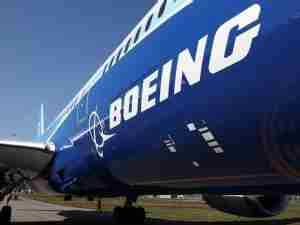Boeing’s Cash Gush Wins Over `Late to the Party’ Stock Pickers
By: | Jul 27 2017 at 03:39 PM | Air Cargo
Boeing Co. basked in a strong earnings report for a second day as four Wall Street analysts upgraded their recommendations on the shares and others lifted their target prices.
Skeptics—with one exception—were won over by Boeing’s surging free cash flow and improved operation margins as its main rival, Airbus SE, stumbled. Surprisingly robust air-traffic growth has also quieted concerns of an aerospace downturn.
The upgraded expectations added to the glow around Boeing, the top performer on the Dow Jones Industrial Average this year with an advance that’s outpaced those of Apple Inc. and McDonald’s Corp. Boeing’s 50 percent jump through the close of trading Wednesday was about five times the Dow’s advance.
“While the financials have already shown significant improvement (particularly cash flow) and we are clearly late to the party, we see scope for further multiple expansion,” Robert Spingarn, analyst with Credit Suisse Group AG, said in a note to clients Thursday. He upgraded the Chicago-based planemaker to outperform from neutral while raising the target price to $300 from $200.
The shares rose 2.2 percent to $238.61 at 1:30 p.m. in New York, after skyrocketing 9.9 percent Wednesday, the most since October 2008.
Buybacks, Dividends
The 12-month target price for the company is now $248.19, up from $206.50 prior to the earnings report, according to data compiled by Bloomberg. Boeing has 14 buys, 12 holds and 1 sell. Richard Safran, an analyst at Buckingham Research Group, still recommends dumping the stock and maintains a price target of $140. He didn’t immediately respond to a request for comment.
Boeing’s free cash flow surged to $4.51 billion in the second quarter, with the manufacturer squeezing costs out of its 787 Dreamliner jet program as its factories ran more efficiently. That was more than double the tally analysts had expected—and Boeing channeled $3.4 billion of the haul to stock buybacks and dividends.
The manufacturer also announced plans to bolster its pension funding with company shares and reported profit that beat estimates. However, a drop in jetliner deliveries that caused second-quarter revenue to plunge 8.1 percent was a reminder of the risks as Boeing brings new planes, like its 737 Max and 777X, to market.
The results won over Goldman Sachs Group Inc.’s Noah Poponak, who had advised investors to sell Boeing shares since Feb. 23, 2015, as slowing jetliner orders signaled the end of a historic sales cycle that has left Boeing and Airbus with a record order backlog. He upgraded the manufacturer to neutral Thursday.
Boeing management’s “control of cost, working capital and cash deployment has been impressive, in the face of declining revenue, and ahead of some negative signals” on the aerospace cycle, Poponak said in a report.
‘Lower Quality’
Poponak pointed to a 60 percent production rate cut to the 777, a main source of profit, which traditionally would have led to deteriorating margins. “Today that hasn’t happened,” he said.
While Ron Epstein of Bank of America Corp. upgraded Boeing to buy, he said that a large portion of its free cash flow was “arguably of lower quality.” The closely watched measure included $2.4 billion from incremental gross advances and progress billings, and $1.1 billion from accounts payable, he said in a report Thursday.
“Although cash from working capital may not be sustainable in the long-term, we now recognize that the market would not likely discriminate against lower quality cash from working capital as long as Boeing continues to generate more cash,” Epstein said.











